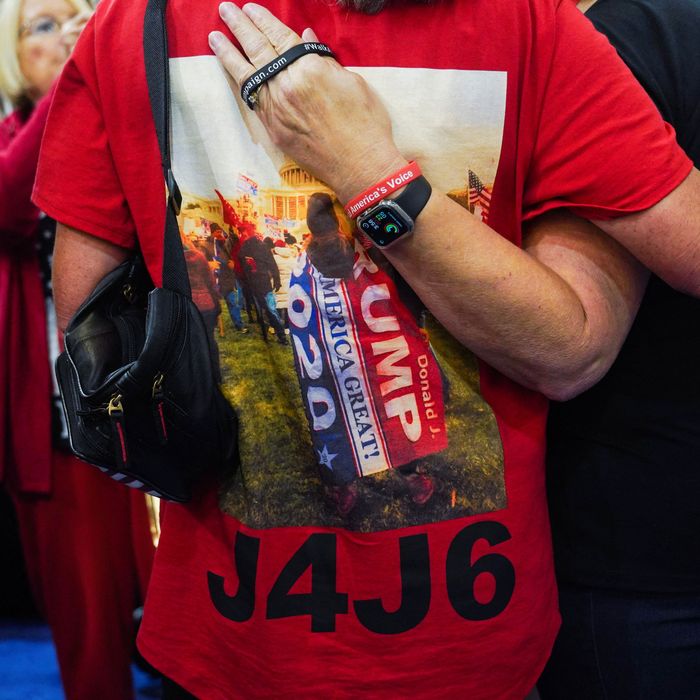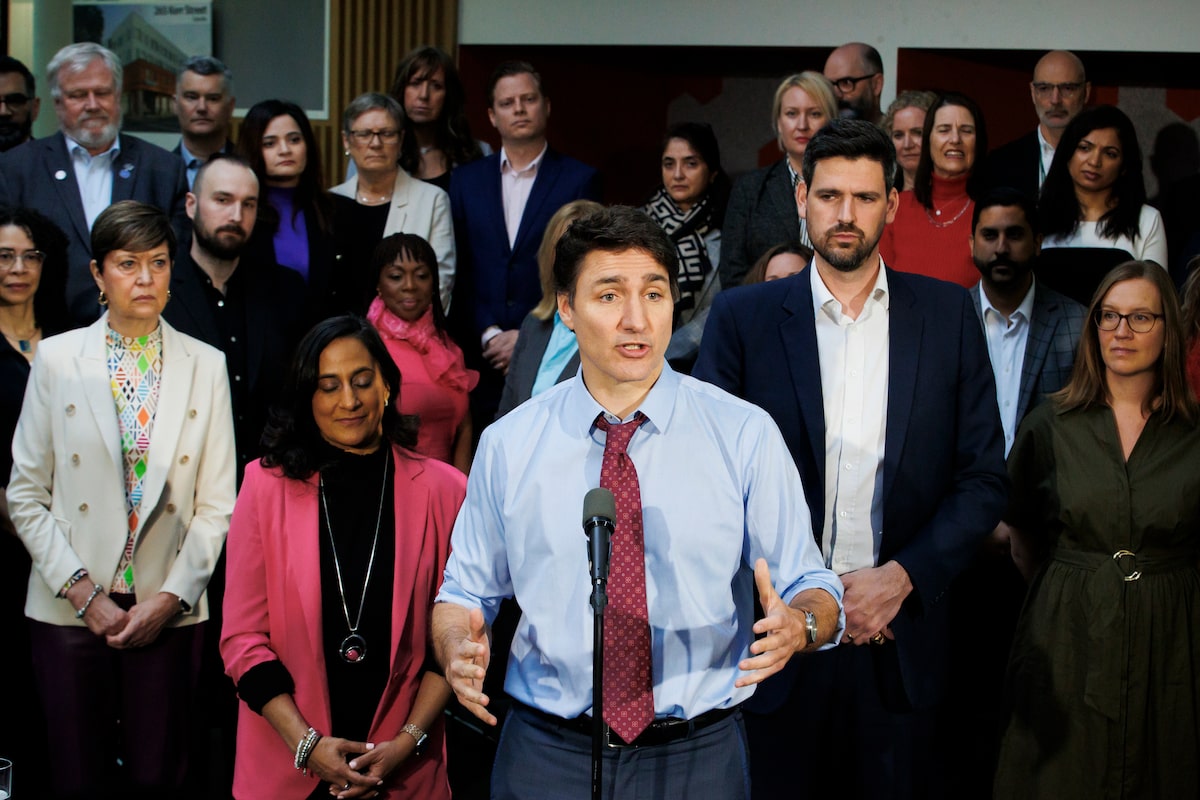Politics
Jeff Sharlet’s ‘The Undertow’ Goes Inside Trump’s America

|
|
Micki Witthoeft, the mother of Ashli Babbitt, wears a T-shirt trumpeting other Capitol rioters at CPAC in 2022.
Photo: Go Nakamura/REUTERS
Maybe it’s hard to believe now, but liberalism once seemed ascendant. In 2008, the nation elected Barack Obama, its first Black president, a man who ran on hope and transformative change. Millennials were secularizing and liberalizing on issues like LGBTQ+ rights. Obama passed health-care reform. Toward the end of his second term, the Supreme Court would rule in favor of marriage equality, and joyful singing crowds swallowed up the bigots who stalked the grounds with their signs and their shofars. The America I knew as a child of the Christian right was far removed from the America I had come to inhabit, or so I thought.
Threats crowded the horizon: The Obama era also marked the rise of the tea party. A year before the Supreme Court extended marriage rights in Obergefell v. Hodges, it found that corporations could refuse to cover contraception if doing so violated their religious beliefs. The year of Obergefell was the year too of Donald Trump. He announced his campaign for president in June 2015, not long before celebratory crowds thronged in front of the Court.
Back then, Trump was a longshot, an unsavory joke. That July, a CNN/Pivit analysis said he had a one percent chance of becoming president. “Donald Trump will not be the 45th president of the United States. Nor the 46th, nor any other number you might name,” James Fallows wrote the same month in The Atlantic. “The chance of his winning nomination and election is exactly zero.” This was the conventional wisdom: The national immune system would kick in, liberals and Never Trumpers said before Trump won the Republican nomination for president. They said the same thing afterward, too. The fever would break and Hillary Clinton would win.
Photo: W. W. Norton
She didn’t. Trump lost the popular vote but won the Electoral College, and his frenzied bigotry had mass appeal far beyond what the professionals expected. I had been working my first job in journalism for six weeks when he secured the presidency. That night, as silence descended over the newsroom, dread caught me by the throat. The America I’d fled in my early 20s had come for the America I’d chosen. There is a popular conviction, at least among liberals, that the Civil War is in the past and such conflicts are now unthinkable. But I had learned something different as a child. I learned that liberalism was the enemy, that the country was in danger, and that when I grew up, I’d have to take it back through politics or at gunpoint. Nobody specified which.
The election of Joe Biden might have slowed the rate of our disunification. What it has not done — and cannot do — is alter the existential conflict that we face. There are many Americas, and they have never been at peace with one another. That tension simmers throughout The Undertow: Scenes From A Slow Civil War, journalist Jeff Sharlet’s latest work of reportage from W.W. Norton. In his books C Street and The Family, Sharlet tracked the political influence of Christian fundamentalism. Now he encounters the foot soldiers and propagandists of an authoritarian movement that is gathering strength.
Much has been written about the figure of Trump: his biography, his appeal, his hold on the Republican Party. Some too have written about Trump’s antecedents in the broader conservative movement. But Sharlet offers something new. He follows the fever to where it burns the hottest, at the base of the Republican Party. The underlying disease is bone-deep, his reporting suggests, and the implications extend far beyond the trajectory of either political party. The triumph of multicultural democracy is in danger. At Trump rallies and church services and meetings with the devout, Sharlet uncovered a country that holds many realities at once, but perhaps not for much longer.
In the centuries since the Founders said all men were created equal, there has never been unified agreement over what this might mean, and for whom. The friction between America’s promises and its practices erupts regularly into violence: into the degradations of chattel slavery, a civil war, and the white terrorism of the Jim Crow South; then into police killings, mass shootings, and the Capitol riot of January 6, 2021. On that day, depending on your interpretation, Ashli Babbitt was either martyred or got herself killed when a police officer shot her in the act of rushing the Speaker’s Lobby. The two perspectives cannot be reconciled.
A more authentic Babbitt emerges from Sharlet’s reporting. “She was not a hashtag,” he writes. He fills in the small details of her life. Before she joined the Air Force at 17, she used to ride her horse to 7-Eleven. She voted for Obama and then, in 2016, she “fell hard for Donald J. Trump.” In death, she has become a meme. “Two words in the mouth of the man for whom she died, who did not bother to say her name for six months after that death, until the day it proved useful. To him,” Sharlet observes. Later, at a rally in Babbitt’s memory, Sharlet spots white nationalists. Fascists start a fight with anti-fascists. “What her death does, when we compare it to Crispus Attucks, is—it calls for a revolution!” a speaker says.
As Sharlet chases Babbitt’s ghost across a fractious landscape, he documents a new kind of civil war. States do not face one another on the battlefield; there is no rebel government. Instead, the battlefield is everywhere, and combatants have, in a sense, already seceded from the United States. That the secession occurred in their minds makes it no less real. They are armed, and they are backed, too, by power and money. They have successfully enthralled a major political party, and their allies are capturing courts and state legislatures. The other side is still catching up to the danger it’s in.
Some perspectives, of course, are more accurate than others. Ashli Babbitt’s America is hostile to pluralism, egalitarianism, and the very notion of democracy. The people who live there long for a strongman and believe they have found him in Trump. Sharlet knows this and contends with the implications throughout The Undertow. Sharp and probing, this book doesn’t indulge in cheap scares. Sharlet is here to inform, and The Undertow is a more powerful warning as a result.
Sharlet greets his subjects with sensitivity and brings forth their humanity, but he is uninterested in false equivalencies. When a protester interrupts a Trump speech, a man in the crowd turns to his woman and says with a smile that he would beat the shit out of him. “He stands up there and says what we all think,” the man tells Sharlet. “We all want to punch somebody in the face, and he says it for us.” Later, Sharlet observes, “Why not take pleasure in power? It feels good to be strong. It is, for the believers, whom Trump calls ‘my people,’ a blessing.”
This is fascism at work, he argues. In footnotes, he says he had once believed that “Christian nationalism’s ostensible commitment to some kind of idea of Christ prevented the movement from ever going all in on the cult of personality necessary to foment true fascism.” He has changed his mind. The movement Trump has inspired “cultivates paramilitaries,” Sharlet writes. It “glorifies violence as a means of purification, thrives on othering its enemies, declares itself persecuted for ‘Whiteness,’ diagnoses the nation as decadent, and embraces the revisionist myth of a MAGA past — as exemplified in its dream of adding Trump’s likeness to Mount Rushmore.”
In the figure of Babbitt, this new fascism sees something holy. She was “transformed” after her death, Sharlet writes, into “yet another flag, like a new tarot card in the deck of fascism,” a unifying symbol. A fringe belief, yes, but a consequential one. “The politics of the fringe may not be rational, but they’re cunning, surrounding the center and moving inward, until suddenly there they are, at the heart of things,” he writes. There is the QAnon Shaman standing in the Senate chamber, and Marjorie Taylor Greene, and Lauren Boebert, and Babbitt herself. The threat is not distant. It’s already here.
The America I once knew, which has become the land of Babbitt and Greene, always planned for expansion and conquest, not coexistence. This nation within a nation wants to triumph over all others. Trump was a means to an end, but he has become more than that, too. Like Babbitt, he is a symbol: an earthly father figure, a reflection of their God.
The Undertow is no mere guide to Trump or how he came to be, however. Sharlet’s ambitions are sweeping. The road to our present state of disunion began long ago, that much he makes clear. He writes first of the late singer and civil-rights activist Harry Belafonte, who pitted the power of his celebrity against the might of white supremacy (Klansmen chased him and Sidney Poitier one Mississippi night in 1964), as American too as the racism that would one day make Trump a power. To struggle for freedom is to live with death, Belafonte knew. He had been close to Martin Luther King Jr., then lost him to hate. “After every great victory, a great murder,” Belafonte tells Sharlet.
Surrender is not a real solution. America contains many possibilities, not all of them grim. Sharlet writes of Occupy Wall Street, which also began in the middle of the Obama era’s ascendant liberalism. A writer from Occupy Nashville tells Sharlet they are no longer operating in ordinary time but in something she calls “movement time.” “What she meant was a sort of slow motion, sped up, outside of the flow of minutes and days, the temporal experience suggested by the Christian theological term kairos, ritual time, a moment that is unique and suffused with moments past,” he theorizes. This made Occupy a kind of holiday. “There is nothing frivolous about that,” he adds. “Holidays are not escapes; at their best, they deepen our experience of things.” The Occupy movement did more than condemn inequality and attack corporate greed; it showed us all a different way of being. That is the power of movement time. It alters reality, and the consequences ripple outward where they take unexpected paths. The result can bring us closer to a future worth living.
Trump may yet be president again. His followers remain devoted, and there are enough of them to make him the early front-runner for the Republican Party nomination. His general-election chances are good but not guaranteed; his movement is a minoritarian one. Even if he loses to Biden a second time, the forces that coalesced around him could outlast his political career. How does the body of the nation come apart? Sharlet asks himself. He writes, “The answer is in the question I’d learned to ask the believers: ‘Do you think there’ll be a civil war?’ They all said ‘Yes.’ Most thought it was coming, soon, and some said it was already here.” A second Trump loss won’t quell such violent conviction.
When I left Evangelicalism over a decade ago, I did so for intellectual and moral reasons but felt, also, that I was joining a winning team. The disappointments of the Obama era radicalized me; I know now that liberalism was more fragile than it seemed. The right regrouped after Obergefell. Intent, still, on pushing LGBTQ+ people back into the closet — or eradicating them altogether — the right presses its case through so-called parental-rights candidates and anti-trans bills. At the same time, it has embraced insurrection and violence, a trend Sharlet depicts throughout The Undertow. In recent months, Trump has been promoting a single recorded by jailed January 6 defendants, and he speaks often of Babbitt as a “Great Patriot” who was murdered.
As the liberal order frays, something new must come into being. “We say we are in crisis,” Sharlet writes. “But that word, crisis, supposes we can act. It supposes the outcome is yet to be determined. The binary yet to be toggled, a happy ending or a sad one, victory or defeat. As if we have not already entered the aftermath.” If the aftermath is here, it demands an honest reckoning. A united America has never existed, and the illusion is now impossible to maintain. When one version of this nation is determined to erase another, a conflict of some kind becomes inevitable. It may well be the slow civil war of Sharlet’s title, waged by conspiracy theorists and donors and legislators, punctuated by the occasional blast of violence. But a slow civil war is still a civil war. The only recourse is to win.





Politics
Trudeau questions Poilievre's judgment, says the Conservative Leader 'will do anything to win' – The Globe and Mail


Prime Minister Justin Trudeau is flanked by Minister of Housing Sean Fraser, right, and Treasury Board President Anita Anand, left, during a press conference in Oakville, Ont., on April 24.Cole Burston/The Canadian Press
Prime Minister Justin Trudeau criticized Pierre Poilievre over his judgment, a day after the Conservative Leader visited a protest against carbon pricing that featured a “Make Canada Great Again” slogan and a symbol that appeared to be tied to a far-right, anti-government group.
Mr. Trudeau accused Mr. Poilievre of exacerbating divisions and welcoming the “support of conspiracy theorists and extremists.”
“Every politician has to make choices about what kind of leader they want to be,” the Prime Minister said at a press conference Wednesday in Oakville, Ont.
“He will do anything to win, anything to torque up negativity and fear and it only emphasizes that he has nothing to say to actually solve the problems that he’s busy amplifying.”
On Tuesday, Mr. Poilievre stopped at a protest against carbon pricing near the New Brunswick-Nova Scotia border while on his way from PEI to Nova Scotia. Video of the protest shows an expletive-laden flag directed at Mr. Trudeau that was a symbol of the anti-vaccine-mandate protests that gripped Ottawa two years ago, as well as an anti-carbon-tax sign and a van with the slogan “Make Canada Great Again” written on it.
“We saw you so I told the team to pull over and say ‘hello,’” Mr. Poilievre said to the protesters in one of the videos posted online. He thanked them for “all you’re doing.”
“We’re going to axe the tax and its going to be in part because you guys fought back,” Mr. Poilievre said in the videos. “Everyone hates the tax because everyone’s been screwed over. People believed his lies. Everything he said was bullshit, from top to bottom.”
When asked to take a picture in front of the flag with the expletive, Mr. Poilievre responded: “Let’s do it in front of something else.”
One of the vans at the protests has what appeared to be a symbol of the anti-government, far-right group called Diagolon. Mr. Trudeau tried on Wednesday to tie that to Mr. Poilievre. The Conservative Leader has previously disavowed the group.
In a statement Wednesday through his lawyer, the group’s leader, Jeremy MacKenzie, said he was Mr. Poilievre’s biggest detractor in Canada. He also criticized Mr. Trudeau, saying “both of these weak men are completely out of touch with reality and incapable of telling the truth.”
Mr. Poilievre’s office defended the Conservative Leader’s visit to the protest in a statement on Wednesday.
“As a vocal opponent of Justin Trudeau’s punishing carbon tax which has driven up the cost of groceries, gas and heating, he made a brief, impromptu stop,” spokesperson Sebastian Skamski said.
“If Justin Trudeau is concerned about extremism, he should look at parades on Canadian streets openly celebrating Hamas’ slaughter of Jews on October 7th.”
During his press conference, Mr. Trudeau also pointed out that Mr. Poilievre has done nothing to reject the endorsement of right-wing commentator Alex Jones earlier this month. Mr. Jones, on X, called Mr. Poilievre “the real deal” and said “Canada desperately needs a lot more leaders like him and so does the rest of the world.”
Mr. Jones was ordered to pay nearly $1-billion in damages to the families of the victims of the deadly 2012 Sandy Hook school shooting, which he portrayed as a hoax.
“This is the kind of man who’s saying Pierre Poilievre has the right ideas to bring the country toward the right, towards conspiracy theories, towards extremism, towards polarization,” Mr. Trudeau said.
In response to the Prime Minister’s remarks, Mr. Skamski said “we do not follow” Mr. Jones “or listen to what he has to say.”
“Common-sense Conservatives are listening to the priorities of the millions of Canadians that want to axe the tax, build the homes, fix the budget and stop the crime,” he added.
“It is the endorsement of hard-working, everyday Canadians that Conservatives are working to earn. Unlike Justin Trudeau, we’re not paying attention to what some American is saying.”
With a report from The Canadian Press.
Politics
Politics Briefing: Younger demographics not swayed by federal budget benefits targeted at them, poll indicates

|
|
Hello,
The federal government’s efforts to connect with Gen Z adults and millennials through programs in last week’s federal budget has not yet worked, says a new poll.
The Angus Reid Institute says today that the opposition Conservatives are running at 43 per cent voter support compared to 23 per cent for the governing Liberals, while the NDP are at 19 per cent.
Polling by the institute also finds the Liberals are the third choice among Gen Z and millennial voters, falling behind the NDP and Conservatives.
According to the institute, Conservative Leader Pierre Poilievre is viewed more positively among Gen Z adults than Prime Minister Justin Trudeau, with Poilievre at 29 per cent approval and Trudeau at 17 per cent. Poilievre also has a higher favorability than Trudeau’s approval among younger and older millennials.
Gen Z adults were born between 1997 and 2012, while the birth period of millennials was 1981 to 1996.
The poll conclusions are based on online polling conducted from April 19 – three days after the budget was released – to April 23, among a randomized sample of 3, 015 Canadians. Such research has a probability sample of plus or minus two percentage points, 19 times out of 20.
Asked about the poll today, Trudeau said the budget is aimed at solving problems, helping young people and delivering homes and services such as child care.
“I am confident that as Canadians see these measures happening, they will be more optimistic about their future, the way we need them to be,” Trudeau told a news conference in Oakville, Ont.
He also said he expected Canadians to be thoughtful about the future when they vote. “I trust Canadians to be reasonable,” he said.
The Globe and Mail has previously reported that Trudeau’s government has set an internal goal of narrowing the Conservative Party’s double-digit lead by five points every six months. A federal election is expected next year.
This is the daily Politics Briefing newsletter, written by Ian Bailey. It is available exclusively to our digital subscribers. If you’re reading this on the web, subscribers can sign up for the Politics newsletter and more than 20 others on our newsletter sign-up page. Have any feedback? Let us know what you think.
TODAY’S HEADLINES
Pierre Poilievre visits convoy camp, claims Trudeau is lying about ‘everything’: CBC reports that the Conservative Leader is facing questions after stopping to cheer on an anti-carbon tax convoy camp near the border between New Brunswick and Nova Scotia, where he bluntly accused Prime Minister Justin Trudeau of lying about “everything.”
Smith defends appointment of task force led by doctor skeptical of COVID-19 measures: The Globe and Mail has published details of the little-known task force that was given a sweeping mandate by the government to assess data used to inform pandemic decision-making. Story here.
Canadians should expect politicians to support right to bail, Arif Virani’s office says: The office of Canada’s Justice Minister says, warning that “immediate” and “uninformed reactions” only worsens matters.
Parti Québécois is on its way back to the centre of Quebec politics: The province’s next general election isn’t until 2026, a political eternity away, and support for separating from Canada remains stagnant. But a resurgent Quebec nationalism, frustration with Ottawa, and the PQ’s youthful, upbeat leader Paul St-Pierre Plamondon have put sovereignty back on the agenda.
Anaida Poilievre in B.C.: The wife of the federal Conservative Leader has been on a visit to Kelowna in recent days that was expected to conclude today, according to Castanet.net.
Ontario to do away with sick note requirement for short absences: The province will soon introduce legislation that, if passed, will no longer allow employers to require a sick note from a doctor for the provincially protected three days of sick leave workers are entitled to.
Australian reporter runs into visa trouble in India after reporting on slaying of Canadian Sikh separatist: In a statement, the New York-based Committee to Protect Journalists said Indian authorities should safeguard press freedom and stop using visa regulations to prevent foreign journalists covering sensitive subjects.
Canadian military to destroy 11,000 Second World War-era pistols: The Ottawa Citizen reports that the move comes as the Canadian Forces confirmed it has received the final deliveries of a new nine-millimetre pistol as part of a $19.4-million project.
B.C. opposition leader in politics-free oasis: The first hint that there may be more to Kevin Falcon, leader of the official opposition BC United party, than his political stereotype comes when you pull up to his North Vancouver home – a single-level country cottage rancher dwarfed on one side by large, angular, modern monstrosity. A NorthernBeat profile.
TODAY’S POLITICAL QUOTES.
“Having an argument with CRA about not wanting to pay your taxes is not a position I want anyone to be in. Good luck with that Premier Moe.” – Prime Minister Justin Trudeau on the Canada Revenue Agency weighing in on Saskatchewan’s government move to stop collecting and remitting the federal carbon levy.
“That’s not something that we’re hoping for. We’re not trying to plan for an election.“ – NDP Leader Jagmeet Singh, at a news conference in Edmonton today, on the possibilities of an election now ahead of the vote expected in the fall of 2025.
THIS AND THAT
Commons, Senate: The House of Commons is on a break until April 29. The Senate sits again April 30.
Deputy Prime Minister’s day: In the Newfoundland and Labrador city of Mount Pearl, Chrystia Freeland held an event to talk about the federal budget.
Ministers on the road: Cabinet efforts to sell the budget continue, with announcements largely focused on housing. Citizens’ Services Minister Terry Beech and Small Business Minister Rechie Valdez are in Burnaby, B.C. Defence Minister Bill Blair is in Yellowknife. Employment Minister Randy Boissonnault is in Edmonton. Environment Minister Steven Guilbeault, Industry Minister François-Philippe Champagne and Natural Revenue Minister Marie-Claude Bibeau are in the Quebec city of Trois-Rivières.
Indigenous Services Minister Patty Hajdu is in Lytton, B.C., with an additional event welcoming members of the Skwlāx te Secwepemcúl̓ecw band to four new subdivisions built after the 2023 Bush Creek East wildfire. International Development Minister Ahmed Hussen is in Sault Ste. Marie. Foreign Affairs Minister Mélanie Joly is in Québec City. Diversity Minister Kamal Khera is in Kingston, Ontario. Immigration Minister Marc Miller and Tourism Minister Soraya Martinez Ferrada are in Whitehorse. Justice Minister Arif Virani and Families Minister Jenna Sudds are in North York, Ont. Veterans Affairs Minister Ginette Petitpas Taylor is in Charlottetown.
Meanwhile, International Trade Minister Mary Ng is in South Korea leading a group of businesses and organizations through to tomorrow.
GG in Saskatchewan: Mary Simon and her partner, Whit Fraser, on the last day of their official visit to Saskatchewan, is in Saskatoon, with commitments that include visiting the Maternal Care Centre at the Jim Pattison Hospital and meeting with Indigenous leaders.
Ukraine needs more military aid, UCC says: The Ukrainian Canadian Congress says Canada should substantially increase military assistance to Ukraine. “As President Zelensky stated, “The key now is speed,’” said a statement today from the organization. The appeal coincides with U.S. President Joe Biden signing into law an aid package that provides over US$61-billion in aid for Ukraine. “We call on the Canadian government and all allies to follow suit and to immediately and substantially increase military assistance to Ukraine,” said the statement. An update issued on the occasion of Prime Minister Justin Trudeau’s February visit to Ukraine noted that, since Russia invaded Ukraine in 2022, the Canadian government has provided $13.3-billion to Ukraine.
New chief commissioner of the Canadian Grain Commission: David Hunt, most recently an assistant deputy minister in Manitoba’s environment department, has been named to the post for a four-year term by Agriculture Minister Lawrence MacAulay.
PRIME MINISTER’S DAY
In Oakville, near Toronto, Justin Trudeau talked about federal-budget housing measures, and took media questions.
LEADERS
Bloc Québécois Leader Yves-François Blanchet is in the Quebec city of Victoriaville, with commitments that include a meeting at the Centre for Social Innovation in Agriculture
Green Party Leader Elizabeth May, in the Vancouver Island city of Nanaimo, attended the sentencing of deputy party leader Angela Davidson, also known as Rainbow Eyes, convicted of seven counts of criminal contempt for her participation in the Fairy Creek logging blockades on Vancouver Island.
NDP Leader Jagmeet Singh, in Edmonton, held a media availability.
No schedule released for Conservative Party Leader Pierre Poilievre.
THE DECIBEL
James Griffiths, The Globe’s Asia correspondent, is on the show t to discuss Article 23 – a new national security law in Hong Kong that includes seven new offences related to sedition, treason and state secrets that is expected to have a chilling effect on protest. The Decibel is here.
OPINION
The Liberals’ capital-gains tax hike punishes prosperity
“In her budget speech this month, Finance Minister Chrystia Freeland pointed to 1980s-era tax changes by the Progressive Conservative government of Brian Mulroney as a precedent for boosting the tax take on capital gains. … If one were to leave it at that, the Liberals come off quite well, having decided to boost the inclusion rate for capital gains – the amount subject to tax – to two-thirds, well below that of the latter years of the Mulroney government. But Ms. Freeland was only telling half the story.” – The Globe and Mail Editorial Board
The Liberals weight-loss goal shows they are running out of options
“The bad polls are weighing down the Liberals, so they have decided to shed some weight: They aim to cut the Conservatives’ lead by five percentage points by July. Like middle-aged dieters beginning a new regime, they’ve looked in the mirror and decided they have to do something. They’ve committed to it, too.” – Campbell Clark
Fear the politicization of pensions, no matter the politician
“Alberta Premier Danielle Smith and federal Finance Minister Chrystia Freeland don’t have a lot in common. But they do share at least one view: that governments could play a bigger role directing pension investments to the benefit of domestic industries and economic priorities. Canadians, no matter who they vote for, should be worried that these two political heavyweights share any common ground in this regard.” – Kelly Cryderman
The failure of Canada’s health care system is a disgrace – and a deadly one
“What can be said about Canada’s health care system that hasn’t been said countless times over, as we watch more and more people suffer and die as they wait for baseline standards of care? Despite our delusions, we don’t have “world-class” health care, as our Prime Minister has said; we don’t even have universal health care. What we have is health care if you’re lucky, or well connected, or if you happen to have a heart attack on a day when your closest ER is merely overcapacity as usual, and not stuffed to the point of incapacitation.” – Robyn Urback





Politics
Pecker’s Trump Trial Testimony Is a Lesson in Power Politics


|
|
David Pecker, convivial, accommodating and as bright as a button, sat in the witness stand in a Manhattan courtroom on Tuesday and described how power is used and abused.
“What I would do is publish positive stories about Mr. Trump,” the former tabloid hegemon and fabulist allowed, as if he was sharing some of his favorite dessert recipes. “And I would publish negative stories about his opponents.”





-
News21 hours ago
Amid concerns over ‘collateral damage’ Trudeau, Freeland defend capital gains tax change
-
Art18 hours ago
The unmissable events taking place during London’s Digital Art Week
-



 Politics23 hours ago
Politics23 hours agoHow Michael Cohen and Trump went from friends to foes
-



 Real eState23 hours ago
Real eState23 hours agoBlending Function and Style: The Best Garage Door Designs for Contemporary Homes
-
Health24 hours ago
Interior Health delivers nearly 800K immunization doses in 2023
-
News22 hours ago
U.K. tabloids abuzz with Canadian’s ‘Loch Ness monster’ photo
-



 Politics22 hours ago
Politics22 hours agoPolitics Briefing: Saskatchewan residents to get carbon rebates despite province’s opposition to pricing program
-
News20 hours ago
What is a halal mortgage? How interest-free home financing works in Canada











